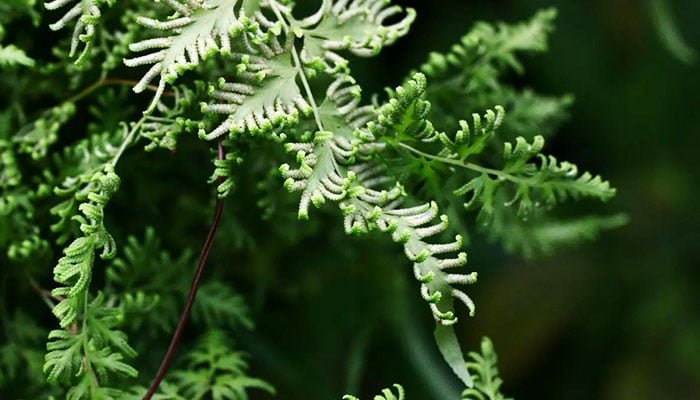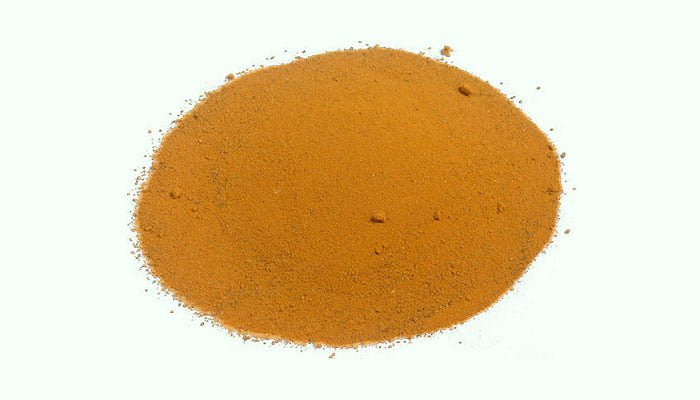What Is Hai Jin Sha
Hai Jin Sha commonly known as Spora Lygodii is the mature spore of Lygodium japonicum, which is a climbing and twining perennial vine-like fern belonging to the family Lygodiaceae. It is a relatively common Chinese herbal medicine, which first appeared in <Jia You ben cao> (Materia medica of Jia You reign) in the Song Dynasty (around 1,057-1,060 AD).
There are about 29 species of Lygodium, which are mainly distributed in tropical and subtropical regions of Asia, Africa, America, and Australia. The most common species of them is Lygodium japonicum.
Lygodium japonicum is also called Japanese climbing fern and is an invasive weed. They like warm and humid environments. They grow well in well-drained soil.
They often grow along roadsides, thickets, forest edges, and jungles, or are entwined around long large plants. They are native to tropical and subtropical Asia and have been introduced to North America, Australia, and Africa.

In autumn, people harvest the vine leaves of Lygodium japonicum, dry them in the sun, take out their spores, remove impurities, and make them into Chinese herbal medicines.
Hai Jin Sha contains kaempferol, kaempferol-7-O-α-L-rhamnopyranoside, nicotflorin, kaempferol-3-O-β-D-glucopyranoside, diosmin, acacetin, acacetin-7-O-β-D-glucopyranoside, linarin, vicenin, apigenin, p-coumaric acid, benzoic acid, vanillic acid, caffeic acid, protocatechuic acid, makisterone C, friedelin, 22-hydroxyhopane, 2α-hydroxyursolic acid, lygodiumsteroside A, lygodiumsteroside B, ponasteroside A, β-sitosterol, daucosterol, succinic acid, oleic acid, linoleic acid, palmitic acid, stearic acid, polysaccharides, and volatile oils.
Generally, the brownish-yellow or light brownish yellow, light-weight, and smooth Hai Jin Sha is preferred.
According to <Compendium of Materia Medica>, the medicinal nature of Hai Jin Sha is relatively cold, with a sweet and salty taste. It has a certain therapeutic effect on the pathological changes of the bladder and small intestine meridians.
In traditional Chinese medicine, it is often used to clear heat and promote diuresis, dispel wind and arrest itching, relieve stranguria and pain, and treat difficulty and pain in micturition, frequent micturition, urgent urination, urinary tract infection, gonorrhea, leukorrhea, jaundice due to damp-heat, nephritis edema, swelling and pain in the throat, dysentery, retention of urine, chyluria, hematuria, stranguria due to hematuria, urinary calculi, chronic prostatitis, eczema, herpes zoster, and hypercalcemia.
There are about 50 kinds of traditional Chinese medicine prescriptions containing it, such as Long Bi Shu Pian, San Jin Tang, and Wu Lin Wan.
Benefits
- Anti-inflammation, inhibiting LPS-induced production of nitric oxide (NO) and tumor necrosis factor (TNF)-α in RAW 264.7 macrophages [1].
- Anti-oxidation, scavenging hydroxyl radicals, superoxide anion radicals, alkyl radicals, and inhibiting lipid peroxidation.
- Promoting the secretion of water in bile to increase the amount of bile in mice without increasing the concentration of bilirubin and cholesterol in bile.
- Reduces blood glucose levels in alloxan-induced diabetes model mice.
- Clearing damp-heat in the small intestine and bladder, relieving dysuria and treating stranguria due to heat, hematuria, or urolithiasis.
- Its total flavonoids have a certain inhibitory effect on the angiogenesis of chicken embryo chorioallantoic membrane and chicken embryo yolk sac membrane.
- Inhibiting Staphylococcus aureus, Escherichia coli, dysenteria bacillus, pseudomonas aeruginosa, typhoid bacillus, Proteus, Bacillus subtilis, and saccharomyces cerevisiae.
- Studies have found that its ethanol extract can reduce kidney peroxides, renal calcium, oxalate content, and the number of kidney oxalate deposits, prevent and treat oxalate kidney stones [2].
- Studies have found that its aqueous ethanol extract can inhibit the activity of testosterone 5α-reductase in vitro, inhibit the growth of the flank organs of testosterone-treated hamsters in vivo, and promote hair regrowth in testosterone-treated mice [3].
Combinations
- It can be used in combination with Ji Nei Jin (Endothelium Corneum Gigeriae Galli), Jin Qian Cao (Herba Lysimachiae), etc. to treat stranguria due to urolithiasis.
- It can be used in combination with Bi Xie (Rhizoma Dioscoreae Hypoglaucae), Hua Shi (Talcum), Shi Chang Pu (Rhizoma Acori Tatarinowii), etc. to treat stranguria due to chyluria.
- It can be used in combination with Ze Xie (Rhizoma Alismatis), Zhu Ling (Polyporus), Fang Ji (Radix Stephaniae Tetrandrae), etc. to treat edema.
- It can be used in combination with Chi Xiao Dou (Adzuki Bean), Dang Gui (Radix Angelicae Sinensis), Hu Po (Succinum), Jin Qian Cao (Herba Lysimachiae), Ji Nei Jin (Endothelium Corneum Gigeriae Galli), Pu Huang (Cattail Pollen), Niu Xi (Radix Achyranthis Bidentatae), Yu Jin (Turmeric Tuber), etc. to treat urolithiasis and urinary tract infections.
- It can be used in combination with Bi Xie (Rhizoma Dioscoreae Hypoglaucae), Tu Fu Ling (Rhizoma Smilacis Glabrae), Huang Bai (Cortex Phellodendri), Che Qian Zi (Semen Plantaginis), Bai Jiang Cao (Patrinia), Shi Chang Pu (Rhizoma Acori Tatarinowii), Dan Shen (Radix et Rhizoma Salviae Miltiorrhizae), San Leng (Rhizoma Sparganii), E Zhu (Rhizoma Curcumae), Wang Bu Liu Xing (Semen Vaccariae), etc. to treat chronic prostatitis.
Side Effects
- At present, there is no literature report that Hai Jin Sha has toxic effects, and no data is showing that taking it at the prescribed dose can cause serious adverse reactions.
Precautions and Warnings
- The dosage of Hai Jin Sha should be controlled at 6-15g.
- It can be made into decoctions, pills, or ground for external use.
- Due to the lightweight of Hai Jin Sha, it is easy to float on the water surface. When making its decoction, you should wrap it in gauze.
- People who are allergic to Hai Jin Sha should not take it.
- Patients with a deficiency of kidney-yin should not take it.
- Pregnant and lactating women should follow medical advice before taking it.
